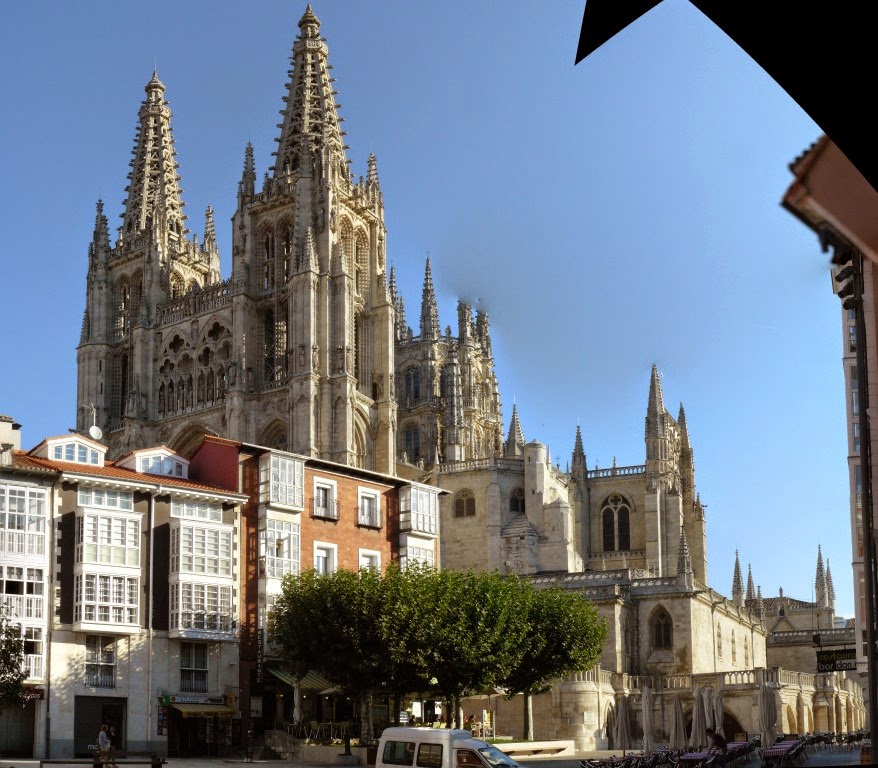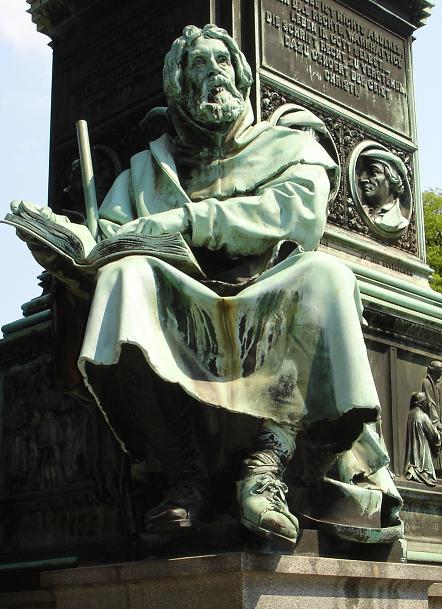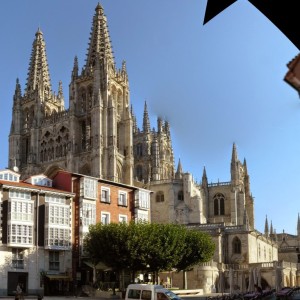 |
| Catedral de Santa María de Burgos, Burgos, Spain |
One of the biggest issues separating Catholics and Protestants is on the nature of the Church: did Christ establish a visible Church, containing both the saved and some number of the damned? Or did He establish an invisible Church that’s just the collection of all the saved? That’s the question that St. Edmund Campion explores in the third of his Ten Reasons against the Reformation.
At hearing the name of the Church the enemy has turned pale. Still he has devised some explanation which I wish you to notice, that you may observe the ruinous and poverty-stricken estate of falsehood. He was well aware that in the Scriptures, as well of Prophets as of Apostles, everywhere there is made honourable mention of the Church: that it is called the holy city, the fruitful vine, the high mountain, the straight way, the only dove, the kingdom of heaven, the spouse and body of Christ, the ground of truth, the multitude to whom the Spirit has been promised and into whom He breathes all truths that make for salvation; her on whom, taken as a whole, the devil’s jaws are never to inflict a deadly bite; her against whom whoever rebels, however much he preach Christ with his mouth, has no more hold on Christ than the publican or the heathen. Such a loud pronouncement he dared not gainsay; he would not seem rebellious against a Church of which the Scriptures make such frequent mention: so he cunningly kept the name, while by his definition he utterly abolished the thing, He has depicted the Church with such properties as altogether hide her away, and leave her open to the secret gaze of a very few men, as though she were removed from the senses, like a Platonic Idea. [….]
What Scripture texts or Scripture meanings or authorities of Fathers thus portray the Church? There are letters of Christ to the Asiatic Churches (Apoc. i. 3), letters of Peter, Paul, John, and others to various Churches; frequent mention in the Acts of the Apostles of the origin and spread of Churches. What of these Churches? Were they visible to God alone and holy men, or to Christians of every rank and degree?
 |
| Statue of Peter Waldo at the Luther Memorial at Worms, Germany |
As Campion notes, the “invisible Church” ecclesiology is without any serious Scriptural support. And it’s explicitly contradicted by an unbroken chain of Christian witnesses. The Christians, from the very beginning, demonstrated their orthodoxy by appealing to apostolic succession, showing that they belonged to the Church founded by Christ upon the Apostles.
These people, if they want to have a Church at all, are compelled to crack up a Church all hidden away; and to claim parents whom they themselves have never known, and no mortal has ever set eyes on, Perhaps they glory in the ancestry of men whom every one knows to have been heretics, such as Aerius, Jovinianus, Vigilantius, Helvidius, Berengarius, the Waldenses, the Lollards, Wycliffe, Huss, of whom they have begged sundry poisonous fragments of dogmas. […]
To think that all Christians should be bidden to join the Church; to beware of being cut down by the spiritual sword; to keep peace in the house of God; to trust their soul to the Church as to the pillar of truth; to lay all their complaints before the Church; to hold for heathen all who are cast out of the Church; and that nevertheless so many men for so many centuries should not know where the Church is or who belong to it! This much only they prate in the darkness, that wherever the Church is, only Saints and persons destined for heaven are contained in it. Hence it follows that whoever wishes to withdraw himself from the authority of his ecclesiastical superior has only to persuade himself that the priest has fallen into sin and is quite cut off from the Church.
So the invisible Church ecclesiology isn’t just unworkable, unscriptural, and unsupported by the first thousand years of Christianity, it’s also dangerous. As Campion notes, this ecclesiology can easily be used to justify schism, which Scripture condemns (Gal. 5:20). In the 434 years since Campion wrote those words, he’s been proven right time and time again by innumerable schisms within Protestantism.

Keep up the good work! if you go to far into 10 reasons, though, you are going to find yourself at odds with H. U. von Balthasar. I think Campion particularly hated Calvin’s atonement doctrine, i.e. that our Lord became polluted with the sins of the world–or at least with the sins of the elect– Balthasar brought this protestant doctrine into the Catholic theology and it now enjoys his respectability
Didn’t these proponents of the ‘Invisible Church’ ever come across, in all of their profound biblical studies, the saying of the Lord:
“You are the light of the world. A city seated on a mountain cannot be hid. [15] Neither do men light a candle and put it under a bushel, but upon a candlestick, that it may shine to all that are in the house.” (Matt.5:14-16) ?
And what about this saying:
“For there shall arise false Christs and false prophets, and shall shew great signs and wonders, insomuch as to deceive (if possible) even the elect. [25] Behold I have told it to you, beforehand. [26] If therefore they shall say to you: Behold he is in the desert, go ye not out: Behold he is in the closets, believe it not.” (Matt. 24: 24-26)
Do these teachings at all indicate that the Lord intended to found an ‘invisible’ Church?
Why did so many of the early popes need to die for their faith, if the Church was so nondescript and invisible? (Not to mention the multitudes of other bishops of the early Church). Bishops of Rome such as:
Saint Peter (c.67), traditionally martyred by crucifixion
Pope Anacletus or Cletus (Saint) (c.79-c.92)
Pope Clement I (Saint) (c.92-c.99), thrown into sea with anchor around his neck
Pope Anicetus (Saint) (155-166), traditionally martyred.
Pope Soter (Saint) (166-175), died a martyr
Pope Eleuterus (Saint) (175-189), died a martyr
Pope Victor I (Saint) 189-199, died a martyr
Pope Zephyrinus (Saint) 199-217, died a martyr
Pope Calixtus I (Saint) (217-222), died a martyr
Pope Urban I (Saint) 222-230, died a martyr
Pope Pontian (Saint) 230-235, condemned to mines in Sardinia and died on island of Tavolara
Pope Anterus (Saint) Elected 12/21/235, martyred at hands of Emperor Maximus
Pope Fabian (Saint) (Elected 1/10/236 and died a martyr 1/20/250 during persecution by Decius)
Pope Cornelius (Saint) (Elected March 251 and died a martyr June 253).
Pope Lucius I (Saint) Elected 6/25/253 and martyred 3/5/254.
Pope Stephen I (Saint) Elected 5/12/254 and martyred 8/2/257.
Pope Sixtus II (Saint) (Elected 8/30/257 and martyred 8/6/258).
Pope Dionysius (Saint) Elected 7/22/259 after year of persecutions and died 12/26/268, martyred
Pope Felix I (Saint) Elected 1/5/269 and died 12/30/274, martyred
Pope Eutychian (Saint) Elected 1/4/275 and martyred 12/7/283.
Pope Caius (Saint) Elected 12/17/283 and martyred 4/22/296, but not at hands of his uncle, Diocletian
Pope Marcellinus (Saint) Elected 6/30/296 and martyred 10/25/304 during persecution of Diocletian
Pope Marcellus I (Saint) Elected 5/27/308 after 4-year vacancy and martyred 1/16/309.
Pope Eusebius (Saint) Elected 4/18/309 and martyred in Sicily 8/17/309.
Pope Martin I (Saint) Elected in 649. Died in exile 9/16/655